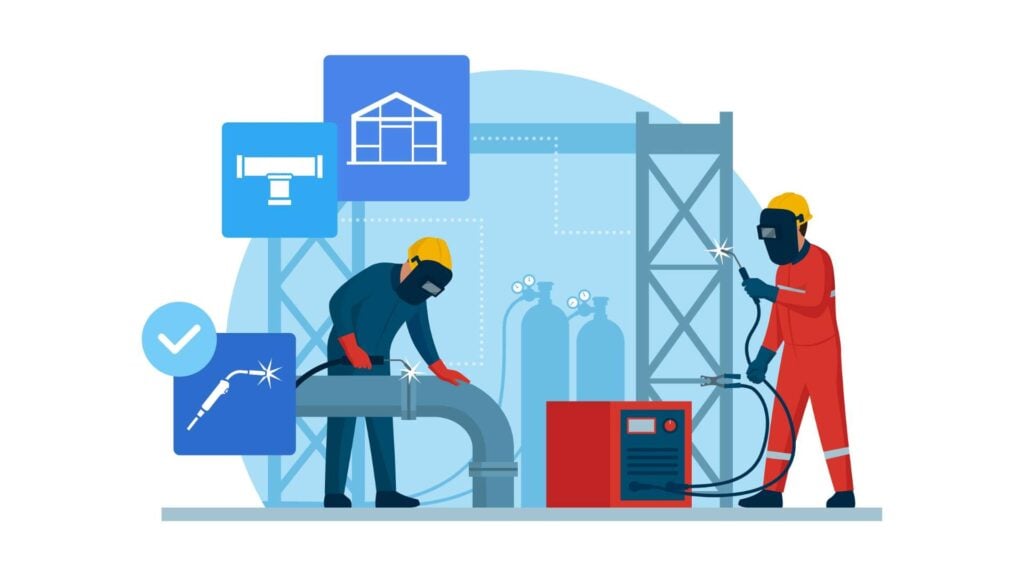Do you know how many types of construction jobs there are in the construction world? It’s far more than just builders and managers.
From entry-level positions that keep your projects moving day-to-day to skilled trades that transform blueprints into reality, the construction industry is full of different jobs and positions.
In this article, I break down what each role entails, the average salaries you can expect, and how these positions contribute to the overall success of your projects.
If you’re thinking about a job in this industry or just want to know more about specific types of construction work out there, this is your go-to guide.
Entry-Level Construction Jobs
Entry-level construction jobs include positions that provide essential support on construction sites, helping maintain workflow and aiding skilled workers. These roles are fundamental in keeping projects moving forward and ensuring day-to-day tasks are accomplished effectively.
Concrete Laborer:
Average salary: $30,000 – $50,000 per year
Concrete laborers are the backbone of concrete construction projects, assisting skilled craftspeople in placing, finishing, and curing concrete.
Their duties involve:
- Preparing the subgrade for concrete pours by leveling, grading, and compacting soil.
- Mixing and transporting concrete using tools like wheelbarrows, concrete buggies, or conveyor belts.
- Assisting concrete finishers by pouring concrete into forms, screeding the surface to achieve a level finish, and smoothing trowel marks.
- Curing concrete by applying water or curing compounds to prevent cracking.
- Cleaning and maintaining concrete tools and equipment.
- Concrete laborers play a vital role in ensuring the quality and proper placement of concrete, a crucial element in many construction projects.
Construction Laborer:
Average salary: $30,800 – $41,200 per year
Construction laborers are the versatile workhorses of a construction site, tackling a variety of tasks to keep the project moving forward.
Their duties can be broad and may include:
- Loading, unloading, and transporting materials using tools and equipment.
- Assisting skilled craftspeople with tasks like mixing concrete, framing walls, or laying bricks.
- Cleaning up debris and maintaining a safe work environment.
- Operating basic machinery and equipment.
- Performing basic demolition activities.
Construction Trades (Skilled Labor)
Construction Trades are professional craftspeople with specialized skills, such as electricians and plumbers, who are crucial for the construction process.
They ensure that all building components are constructed correctly and meet aesthetic standards, turning architectural plans into physical structures.
Bricklayer:
Average salary: $39,000 – $61,000 per year
Bricklayers are skilled craftspeople who specialize in laying bricks to construct walls, foundations, chimneys, and other structures. Their tasks involve:
- Reading and interpreting blueprints and specifications to understand the design and layout of the brickwork.
- Selecting the appropriate type of brick based on the project requirements and desired aesthetics.
- Mixing mortar, a special binding agent, and applying it to lay bricks in a precise pattern and ensure strong bonds.
- Cutting and shaping bricks to fit around corners, openings, or other features.
- Using leveling tools and plumb bobs to ensure the brickwork is straight and level.
- Finishing the brickwork by cleaning mortar stains, applying a sealant, or creating decorative patterns.
- Bricklayers contribute to the building’s structural integrity and aesthetics with their skilled masonry work.
Carpenter:
Average salary: $50,000 – $80,000 per year
Carpenters are versatile craftspeople who work with wood to build, install, and repair various structures and fixtures.
Their tasks involve:
- Reading and interpreting blueprints and specifications to understand the design and construction details of the carpentry work.
- Selecting the appropriate type and grade of lumber for the project.
- Using various woodworking tools and machinery to cut, shape, assemble, and install wood components.
- Building framing for walls, roofs, floors, and other building elements.
- Constructing doors, windows, cabinets, stairs, and other interior and exterior trim features.
- Installing flooring materials such as hardwood, laminate, or tile.
- Repairing and maintaining existing wooden structures and fixtures.
- Carpenters play a crucial role in constructing and finishing the interior and exterior elements of buildings.
Drywaller:
Average salary: $42,790 average per year
Drywallers are the specialists who transform bare walls and ceilings into smooth, finished surfaces.
Their primary tasks involve:
- Installing drywall panels onto walls and ceilings, using tools like lifts, saws, and drills.
- Taping and mudding joints between drywall panels to create a seamless and level surface.
- Sanding the taped and mudded joints to achieve a smooth finish, ready for painting or other decorative applications.
- Repairing damaged drywall sections by patching holes or replacing damaged panels.
- May also be responsible for installing corner beads, trims, and other finishing touches.

Electrician:
Average salary: $60,000 – $90,000 per year
Electricians are skilled professionals responsible for installing, maintaining, and repairing electrical wiring, fixtures, and control equipment within a building.
Their tasks involve:
- Reading and interpreting electrical blueprints and specifications to understand the electrical layout of the building.
- Installing electrical wiring, conduits, and electrical boxes according to project plans and safety codes.
- Connecting electrical panels, lighting fixtures, outlets, and other electrical components.
- Testing and troubleshooting electrical systems to ensure they function properly and safely.
- Performing maintenance and repairs on existing electrical systems.
- Electricians play a vital role in ensuring the safe and functional operation of a building’s electrical systems.
Management Tip:
Regularly update your team’s knowledge on the latest electrical codes and safety standards. Consider hosting semi-annual training sessions to keep everyone current and compliant.
Make use of dedicated employee training software developed for field workers to keep your team fully up to date with all codes.
Learn more about Connecteam’s employee training features.
Flooring Installer:
Average salary: $30,000 – $65,000 per year
Flooring installers specialize in laying down various types of flooring materials, such as carpet, tile, hardwood, or laminate.
Their duties involve:
- Preparing the subfloor by ensuring it’s level, clean, and dry for proper installation.
- Measuring and cutting flooring materials to fit the specific space.
- Laying down the chosen flooring material according to the manufacturer’s specifications and industry standards.
- Securing the flooring material using adhesives, nails, or other appropriate methods.
- Trimming and finishing the edges of the flooring for a professional look.
Glazier:
Average salary: $48,210 average per year
Glaziers are skilled craftspeople who install glass, windows, and other transparent or translucent materials in buildings and structures.
Their tasks involve:
- Reading and interpreting blueprints and specifications to understand the type, size, and placement of glass or glazing materials.
- Cutting glass to size using specialized tools and equipment, ensuring precise measurements and minimal waste.
- Preparing window frames and other surfaces for glass installation, ensuring proper sealing and weatherproofing.
- Installing glass or glazing materials using appropriate techniques and safety measures.
- Applying sealants and trims to ensure a weatherproof and aesthetically pleasing finish.
- Glaziers may also be responsible for repairing or replacing damaged glass or windows.
This Might Interest You
Explore in-depth strategies for managing a thriving construction business with our guide on running a construction business.
HVAC Technician:
Average salary: $57,410 average per year
HVAC technicians install, maintain, and repair heating, ventilation, and air conditioning (HVAC) systems in residential and commercial buildings.
Their tasks involve:
- Reading and interpreting blueprints and schematics to understand the HVAC system layout.
- Installing new HVAC equipment according to manufacturer’s specifications and building codes.
- Performing preventative maintenance on existing HVAC systems to ensure efficient operation and prevent breakdowns.
- Troubleshooting and repairing malfunctioning HVAC systems to diagnose and fix problems.
- Cleaning and maintaining HVAC components to optimize performance and air quality.
- HVAC technicians ensure the building’s occupants have a comfortable and healthy indoor environment.
Insulator:
Average salary: $47,330 average per year
Insulators specialize in installing insulation materials in buildings and structures to regulate temperature, control noise, and improve energy efficiency.
Their tasks involve:
- Selecting the appropriate type and thickness of insulation material based on the application and building codes.
- Preparing surfaces for insulation installation, ensuring a clean and dust-free environment.
- Installing insulation materials in walls, ceilings, attics, floors, and crawl spaces using different techniques depending on the material and location.
- Cutting and fitting insulation materials to fit around pipes, ducts, and other building elements.
- Sealing gaps and air leaks to ensure optimal insulation performance.
- Insulators contribute to a building’s energy efficiency and create a more comfortable indoor environment.
Ironworker:
Average salary: $45,590 average per year
Ironworkers are skilled professionals who fabricate, erect, and install structural steel and ornamental ironwork in buildings and bridges.
Their duties involve:
- Reading and interpreting blueprints and shop drawings to understand the design and specifications of the steel components.
- Operating various tools and machinery to cut, bend, weld, and assemble steel components according to plans.
- Rigging and hoisting steel members into place using cranes and other lifting equipment.
- Welding steel structures together to create a strong and secure connection.
- Installing prefabricated ornamental ironwork, such as railings, stairs, and decorative features.
- Ironworkers play a crucial role in constructing the skeleton of buildings and bridges using steel.
Landscaper:
Average salary: $25,000 – $50,000 per year
Landscapers are outdoor artists who transform yards and green spaces into beautiful and functional areas.
Their tasks involve:
- Consulting with clients to understand their vision and desired landscaping features.
- Designing and planning landscaping projects, considering factors like plant selection, hardscaping elements, and irrigation systems.
- Preparing the landscape by removing debris, grading soil, and installing edging.
- Planting trees, shrubs, flowers, and other vegetation according to design plans.
- Installing hardscaping elements such as patios, walkways, retaining walls, and water features.
- Maintaining landscapes by mowing lawns, trimming hedges, weeding flower beds, and applying fertilizer or mulch.
- Landscapers contribute to the beauty and functionality of outdoor spaces, creating enjoyable environments for property owners.
Mason:
Average salary: $35,000 – $70,000 per year
Masons are skilled craftspeople who work with various materials like brick, stone, concrete, and block to construct and repair structures.
Their duties involve:
- Reading and interpreting blueprints and specifications to understand the design and construction details of the masonry project.
- Selecting the appropriate materials and tools based on the project requirements.
- Mixing mortar, a special binding agent, and applying it to lay bricks, stones, or blocks in a precise pattern and ensure strong bonds.
- Cutting and shaping masonry materials to fit specific locations or designs.
- Finishing masonry surfaces using techniques like pointing or brushing to achieve a desired aesthetic.
- Masons may also specialize in specific areas like bricklaying, stonework, or concrete finishing.

Painter:
Average salary: $42,490 average per year
Painters are responsible for applying paint or other coatings to protect, decorate, and improve the appearance of interior and exterior surfaces.
Their tasks involve:
- Preparing surfaces for painting by cleaning, sanding, repairing minor imperfections, and applying primer if necessary.
- Selecting the appropriate type of paint or coating based on the surface material, desired finish, and environmental conditions.
- Mixing paint and applying it using various tools like brushes, rollers, and sprayers.
- Masking off areas that should not be painted to ensure a clean and professional finish.
- Cleaning up work areas after completing painting tasks.
- Painters contribute to the aesthetics and functionality of a building by providing a protective and visually appealing finish.
Pipefitter:
Average salary: $60,000 – $90,000 per year
Pipefitters are skilled craftspeople who install, maintain, and repair piping systems that transport fluids and gases in buildings and industrial facilities.
Their duties involve:
- Reading and interpreting blueprints and specifications to understand the layout and requirements of the piping system.
- Cutting, threading, bending, and fabricating pipes using specialized tools and equipment.
- Joining pipes together using techniques like welding, soldering, or flanging.
- Installing valves, gauges, and other pipe fittings to control and monitor the flow of fluids and gases.
- Testing and inspecting piping systems to ensure they are leak-proof and function properly.
- Maintaining and repairing existing piping systems to address leaks, blockages, or other malfunctions.
- Pipefitters play a vital role in ensuring the efficient and safe operation of plumbing, heating, cooling, and other piping systems.
Plumber:
Average salary: $55,440 average per year
Plumbers are skilled professionals responsible for installing, maintaining, and repairing piping systems that transport water, waste, and other fluids in buildings and industrial facilities.
Their day-to-day tasks involve:
- Reading and interpreting blueprints and specifications to understand the layout and design of the plumbing system.
- Selecting the appropriate pipes, fittings, and fixtures based on project requirements and building codes.
- Cutting, threading, and bending pipes using specialized tools.
- Joining pipes together using techniques like soldering, welding, or using connectors.
- Installing sinks, toilets, faucets, water heaters, and other plumbing fixtures.
- Troubleshooting and repairing leaks, clogs, and other plumbing problems.
- Plumbers ensure the proper functioning and sanitation of a building’s water supply and drainage systems.
Roofer:
Average salary: $49,090 average per year
Roofers specialize in installing, repairing, and maintaining the roofs of buildings of all types. Their tasks involve:
- Inspecting existing roofs to identify damage, wear, and tear.
- Selecting the appropriate roofing materials based on factors like climate, building design, and budget.
- Installing underlayment, flashing, and other components to ensure a watertight seal.
- Shingling roofs using asphalt, slate, tile, metal, or other materials according to specific application methods.
- Repairing damaged roof sections by replacing shingles, flashing, or other components.
- Performing preventative maintenance on roofs to extend their lifespan and prevent leaks.
- Roofers play a vital role in protecting buildings from the elements.
Scaffolder:
Average salary: $30,000 – $55,000 per year
Scaffolders are essential for creating safe and temporary platforms used by construction workers to access different heights and areas of a building during construction, renovation, or maintenance.
Their tasks involve:
- Reading and interpreting blueprints and specifications to understand the design and layout of the scaffolding system.
- Selecting the appropriate scaffolding components such as tubes, planks, connectors, and guardrails.
- Erecting, dismantling, and maintaining scaffolding structures according to safety regulations and industry standards.
- Inspecting scaffolding components for wear and tear to ensure their safety and stability.
- Securing scaffolding to the building structure to ensure stability and prevent collapse.
Tile Setter:
Average salary: $30,000 – $65,000 per year
Tile setters specialize in installing ceramic, stone, or mosaic tiles on floors, walls, countertops, and other surfaces.
Their tasks involve:
- Preparing surfaces by ensuring they are level, smooth, and clean to receive tile installation.
- Selecting the appropriate type of tile adhesive or mortar based on the application and substrate.
- Mixing and applying adhesive or mortar to the surface according to manufacturer’s specifications.
- Laying tiles in a precise pattern, ensuring proper alignment and spacing for a visually pleasing finish.
- Cutting tiles to fit around corners, fixtures, or other obstacles.
- Grouting the spaces between tiles to create a waterproof and finished look.
- Sealing the tile installation to protect it from moisture and stains.
- Tile setters contribute to the beauty and functionality of interior and exterior spaces.

Welder:
Average salary: $49,540 average per year
Welders are skilled craftspeople who use heat to join pieces of metal together permanently.
Their duties involve:
- Reading and interpreting blueprints and welding procedures to understand the required weld type, size, and location.
- Selecting the appropriate welding process, equipment, and filler metal based on the type of metal and desired weld characteristics.
- Preparing the metal surfaces to be welded by cleaning, grinding, and beveling edges if necessary.
- Operating welding equipment such as arc welders, MIG welders, TIG welders, or oxy-fuel torches to create strong and durable welds.
- Inspecting welds visually and using non-destructive testing methods to ensure they meet quality standards.
- Welders play a crucial role in fabricating and assembling metal structures used in construction, manufacturing, and various other industries.
Construction Technicians
Construction Technicians are skilled operators who manage heavy machinery and execute precise tasks essential for modern construction projects. Their expertise in handling complex equipment is fundamental to maintaining safety and efficiency on site.
Crane Operator:
Average salary: $40,000 – $75,000 per year
Crane operators are skilled professionals responsible for safely and efficiently operating cranes to lift, move, and place heavy materials and equipment on a construction site.
Their duties involve:
- Operating various types of cranes, such as mobile cranes or tower cranes, based on the project needs.
- Interpreting blueprints and lifting plans to determine the weight, size, and placement of materials.
- Communicating effectively with crew members using hand signals or radios to ensure safe and precise lifting operations.
- Performing pre-operation checks on the crane to ensure it’s functioning properly.
- Maintaining a focus on safety throughout the workday to prevent accidents and injuries.
Heavy Equipment Operator:
Average Salary: $34,000 – $74,000 per year
Heavy equipment operators are responsible for operating a variety of large and powerful machines used in construction projects. These machines can include excavators, bulldozers, loaders, graders, and more (similar to Operating Engineers).
Their duties involve:
- Selecting the appropriate equipment for the specific task based on project requirements.
- Operating the chosen equipment safely and efficiently, following all safety protocols.
- Performing pre-operation checks on the equipment to ensure it’s functioning properly.
- Loading, unloading, and transporting materials using the equipment’s attachments.
- Excavating, grading, and leveling terrain according to project plans and specifications.
- Demolishing structures or clearing debris as needed.
- Heavy equipment operators play a crucial role in preparing construction sites and performing heavy-duty tasks that would be difficult or impossible with manual labor.
Pro Tip
We put together a construction inspection checklist for heavy machinery and hand-held tools to ensure all of your equipment is up to safety standards.
Operating Engineer:
Average salary: $53,950 average per year
Operating engineers are responsible for operating a variety of heavy machinery used in construction projects, similar to heavy equipment operators. These machines can include excavators, bulldozers, loaders, graders, backhoes, cranes, paving machines, and more.
Their duties involve:
- Selecting the appropriate equipment for the specific task based on project requirements.
- Operating the chosen equipment safely and efficiently, following all safety protocols.
- Performing pre-operation checks on the equipment to ensure it’s functioning properly.
- Loading, unloading, and transporting materials using the equipment’s attachments.
- Excavating, grading, and leveling terrain according to project plans and specifications.
- Demolishing structures or clearing debris as needed.
Rigger:
Average Salary: $32,480 to $78,200 per year
Riggers are the vital link between crane operators and the loads being lifted on construction sites. They ensure safe and efficient movement of heavy materials by attaching slings, directing the crane operator, and maintaining safety protocols.
Their work typically includes:
- Works alongside crane operators to safely and efficiently lift and move heavy loads on construction sites.
- Attaches and detaches loads to and from the crane using slings and other rigging equipment, ensuring secure and proper attachment following established protocols.
- Guides the crane operator through hand signals or radio communication, directing the movement of the load to the designated position with precision and safety.
- Conducts visual inspections of slings and other lifting equipment to identify potential damage or wear before use.
- May assist with load preparation and ensure the weight of the load is within the crane’s capacity.
- Plays a vital role in maintaining a safe work environment by adhering to safety protocols and immediately stopping operations if unsafe conditions are identified.
Surveyor:
Average salary: $62,240 average per year
Surveyors are the specialists who measure and map the physical features of a piece of land. Their tasks involve:
- Researching property lines, easements, and other legal restrictions using maps, deeds, and public records.
- Using specialized equipment like surveying instruments, GPS technology, and drones to measure distances, angles, and elevations.
- Collecting and analyzing field data to create accurate maps and plans of the property.
- Setting out building locations, property boundaries, and reference points for construction projects.
- Surveying plays a vital role in ensuring accurate land development and construction projects.
Construction Engineering
Construction Engineering (Requires Engineering Background and Education) encompasses engineers who design, plan, and supervise construction projects to ensure they are safe, efficient, and compliant with regulations. Their work is vital in making sure that buildings and infrastructure are capable of standing the test of time and meeting all necessary standards.

Architect:
Average salary: $60,000 – $140,000+ per year
Architects are the creative visionaries behind the design of buildings and structures. They transform ideas and functional requirements into aesthetically pleasing and functional spaces. Their responsibilities encompass:
- Collaborating with clients to understand their needs, budget, and desired aesthetics for the project.
- Developing conceptual designs that translate the client’s vision into a physical form.
- Creating detailed construction drawings and specifications that outline the building’s design, materials, and construction methods.
- Consulting with structural, mechanical, and other engineers to ensure the design is feasible and meets building codes.
- Selecting materials, finishes, and fixtures that contribute to the overall design intent.
- Obtaining necessary permits and approvals from local authorities.
- Overseeing the construction process to ensure adherence to the design plans.
- Architects play a leading role in shaping the built environment and creating structures that are not only functional but also inspiring.
Civil Engineer:
Average salary: $60,000 – $90,000 per year
While not a constant presence on the construction site, civil engineers play a critical role in designing and overseeing civil infrastructure projects such as roads, bridges, and dams. Their involvement typically begins with conducting site surveys and analyzing soil conditions to determine the project’s feasibility. Civil engineers then design the project’s civil elements, including foundations, drainage systems, and utility connections. They create detailed construction plans and specifications to guide the building process. Although their primary work is conducted off-site, civil engineers may visit the construction site periodically to review progress, ensure adherence to plans, and address any technical challenges that may arise. Throughout the project lifecycle, civil engineers collaborate with architects, contractors, and other stakeholders to ensure the project’s success.
Electrical Engineer:
Average salary: $70,000 – $150,000+ per year
Electrical engineers design, develop, test, and oversee the manufacture of electrical equipment, systems, and components. They play a crucial role in bringing electricity to our homes, workplaces, and industries.
Their responsibilities include:
- Design electrical systems for buildings, power plants, machinery, and other applications.
- Perform calculations to ensure electrical systems function safely and efficiently.
- Select appropriate electrical components such as motors, transformers, and control panels.
- Develop and maintain technical documentation like schematics and wiring diagrams.
- Oversee the installation, testing, and commissioning of electrical systems.
- Collaborate with other engineers, architects, and contractors on construction projects.
- Stay up-to-date on advancements in electrical technologies and codes.
Environmental Engineer:
Average salary: $65,000 – $130,000 per year
Environmental engineers play a crucial role in ensuring construction projects comply with environmental regulations and minimize their impact on the environment.
Their involvement may include:
- Conducting environmental site assessments to identify potential hazards like asbestos or contaminated soil.
- Developing plans to mitigate any environmental risks associated with the construction project.
- Designing sustainable construction practices to minimize waste and resource consumption.
- Monitoring the construction site to ensure compliance with environmental regulations.
- Collaborating with architects, contractors, and other stakeholders to ensure the project adheres to environmental best practices.
Mechanical Engineer:
Average salary: $70,000 – $130,000 per year
Mechanical engineers are the jack-of-all-trades in the world of motion and machines. They design, develop, analyze, and oversee the creation of mechanical systems used in countless applications.
Their responsibilities include:
- Design and develop mechanical systems for a wide range of products, from automobiles and robots to heating and cooling systems.
- Perform calculations to ensure functionality, efficiency, and safety of mechanical systems.
- Select appropriate materials and components based on application requirements.
- Create technical drawings and specifications for manufacturing.
- Analyze and troubleshoot mechanical problems to optimize performance.
- Oversee the manufacturing, testing, and installation of mechanical systems.
- Collaborate with other engineers, designers, and manufacturing personnel.
- Stay current with advancements in mechanical technologies and materials.
Structural Engineer:
Average salary: $70,000 – $135,000 per year
Structural engineers are the backbone of the built environment, ensuring the stability and strength of buildings and structures. They translate architectural visions into designs that can withstand various loads and forces.
Their responsibilities include:
- Analyze project requirements and site conditions.
- Design structural elements like foundations, beams, columns, floors, and roofs.
- Perform complex calculations to ensure structural integrity.
- Create detailed plans and specifications for construction.
- Review and approve shop drawings for structural components.
- Collaborate with architects, other engineers, and contractors.
- Conduct site visits to monitor construction progress and address challenges.
Construction Management
Construction Management involves professionals who manage the planning, execution, and delivery of construction projects. They play a key role in ensuring projects are completed on time, within budget, and to the highest quality, orchestrating the work of diverse teams and resources.
Pro Tip
Streamline project management and improve team communication with Connecteam’s construction site management software. From employee scheduling to real-time updates, ensure your construction projects stay on track and within budget.
Construction Estimator:
Average salary: $114,500 – $156,500 per year
Construction estimators are the financial guardians of a construction project. Working primarily in an office environment, they are not physically present on the construction site. Their primary task is to meticulously analyze project blueprints, specifications, and material lists. They then research current market rates for labor, materials, and equipment to create detailed cost estimates for the entire construction project using specialized software. Construction estimators also factor in contingencies for unforeseen circumstances and potential project delays to ensure the accuracy of their estimates. Once complete, they present their estimates to clients and contractors for bidding and project approval.

Construction Inspector:
Average salary: $77,830 average per year
Construction inspectors are the guardians of quality and safety on construction sites. They ensure projects adhere to building codes, plans, and safety regulations. They act as the watchful eye for authorities or clients, safeguarding the integrity and quality of the final structure.
Their responsibilities include:
- Review building plans and specifications for compliance with codes and safety standards.
- Conduct regular site inspections to monitor progress and identify any deviations or safety hazards.
- Document findings through reports and photographs.
- Collaborate with stakeholders to address discrepancies and ensure adherence to regulations.
- Verify material quality and workmanship through inspections or testing reports.
- Enforce safety protocols and investigate accidents or near misses.
Construction Manager:
Average salary: $89,000 – $166,000 per year
Construction managers are the leaders who orchestrate the entire construction process. They oversee all aspects of the project, from planning and scheduling to budgeting and safety.
Construction managers typically:
- Collaborate with architects, engineers, and subcontractors to develop a project plan and timeline.
- Manage budgets and ensure the project stays on track financially.
- Hire and supervise construction crews, assigning tasks and ensuring quality workmanship.
- Coordinate material deliveries and equipment rentals.
- Address any challenges or problems that arise during construction.
- Maintain communication with all project stakeholders, including clients, architects, and engineers.
Construction Superintendent:
Average salary: $80,000 – $100,000 per year
Construction superintendents act as the right hand of the construction manager, overseeing the day-to-day operations on the job site. They ensure that the project is built according to plans, stays within budget, and adheres to safety regulations.
Construction superintendents typically:
- Supervise construction crews and ensure they are performing tasks safely and efficiently.
- Monitor construction progress and identify any potential delays or issues.
- Coordinate with subcontractors and ensure their work aligns with the overall project schedule.
- Maintain a safe work environment and enforce safety protocols.
- Report progress and any challenges to the construction manager.
Foreman:
Average salary: $50,000 – $90,000+ per year
Foremen act as the crew leaders on a construction site, overseeing a specific group of workers and ensuring tasks are completed efficiently and safely.
Their responsibilities include:
- Assigning tasks to crew members based on their skills and experience.
- Providing on-the-job training and guidance to ensure quality workmanship.
- Monitoring the progress of assigned tasks and making adjustments as needed.
- Maintaining a safe work environment and enforcing safety protocols.
- Ensuring crew members have the necessary tools and materials to complete their tasks.
- Communicating with the construction superintendent or manager regarding progress, challenges, and resource needs.
Project Engineer:
Average salary: $65,000 – $85,000 per year
Project engineers act as the backbone of the construction process, overseeing the technical aspects of a project from start to finish.
Their responsibilities encompass:
- Collaborating with architects, designers, and other engineers to develop project plans and ensure technical feasibility.
- Estimating project costs, timelines, and material requirements.
- Overseeing construction activities and ensuring adherence to plans and specifications.
- Identifying and resolving technical challenges that arise during construction.
- Monitoring quality control procedures to ensure the project meets the required standards.
- Coordinating with subcontractors and suppliers to ensure timely delivery of materials and services.
- Communicating project progress, issues, and solutions to stakeholders like clients and managers.
- Project engineers play a crucial role in the successful completion of construction projects within budget and on schedule.
Quantity Surveyor:
Average salary: $50,000 – $100,000+ per year
Quantity surveyors play a vital role in managing the financial aspects of a construction project. They primarily work in an office environment, meticulously analyzing project plans and specifications.
Their duties involve:
- Estimating the quantities of materials, labor, and equipment required for the project.
- Researching current market rates for materials, labor, and equipment to create cost estimates.
- Preparing detailed cost breakdowns for different project phases.
- Identifying potential cost risks and proposing mitigation strategies.
- Negotiating contracts with subcontractors and suppliers.
- Managing project budgets and monitoring costs throughout construction.
- Quantity surveyors ensure the project stays within budget by providing accurate cost estimates and managing project finances effectively.
Safety Manager/Officer:
Average salary: $55,000 – $100,000+ per year
Safety managers and officers are responsible for creating and enforcing safety protocols on construction sites to prevent accidents and injuries.
Their duties involve:
- Developing and implementing comprehensive safety programs that comply with all relevant regulations.
- Conducting safety inspections to identify potential hazards and ensure workers are following safety procedures.
- Providing safety training to workers on various topics like fall protection, hazard communication, and proper use of personal protective equipment (PPE).
- Investigating accidents and near misses to identify root causes and implement corrective measures.
- Maintaining safety documentation and records.
- Communicating safety best practices to all workers on the site.
- Safety managers and officers play a critical role in promoting a safe work environment for everyone on the construction site.
Did You Know?
Investing in comprehensive accident-prevention programs can reduce workplace incidents by up to 85%. Effective safety training not only saves lives but can also significantly reduce your insurance premiums.
A dedicated construction app like Connecteam can help you ensure all of your workers are up to date on the latest safety measures (and it keeps full track of every training conducted to keep you compliant).
Site Engineer:
Average salary: $60,000 – $100,000+ per year
Site engineers act as the technical representatives for the project engineer or architect on the construction site. They oversee the day-to-day construction activities and ensure adherence to plans and specifications.
Their responsibilities include:
- Collaborating with foremen and crew members to ensure tasks are completed according to plans and schedules.
- Monitoring construction progress and identifying any potential delays or problems.
- Inspecting materials and workmanship to ensure they meet quality standards.
- Resolving technical issues that arise during construction.
- Maintaining detailed records of construction progress and daily logs.
- Communicating with the project engineer, architect, and other stakeholders regarding progress, challenges, and solutions.
- Site engineers bridge the gap between the project plans and their execution on the construction site.
FAQs
How many types of construction work are there?
While it’s difficult to pinpoint a single number due to variations, construction can be broadly categorized by project purpose (residential, commercial, industrial, etc.) or by construction phases (foundation, framing, finishing, etc.).
What job makes the most in construction?
In construction, high-paying jobs often involve engineering backgrounds or leadership roles. Examples include Civil Engineer, Construction Manager, or Project Manager. Their salaries can vary depending on experience and location, but tend to be at the top of the construction industry pay scale.

